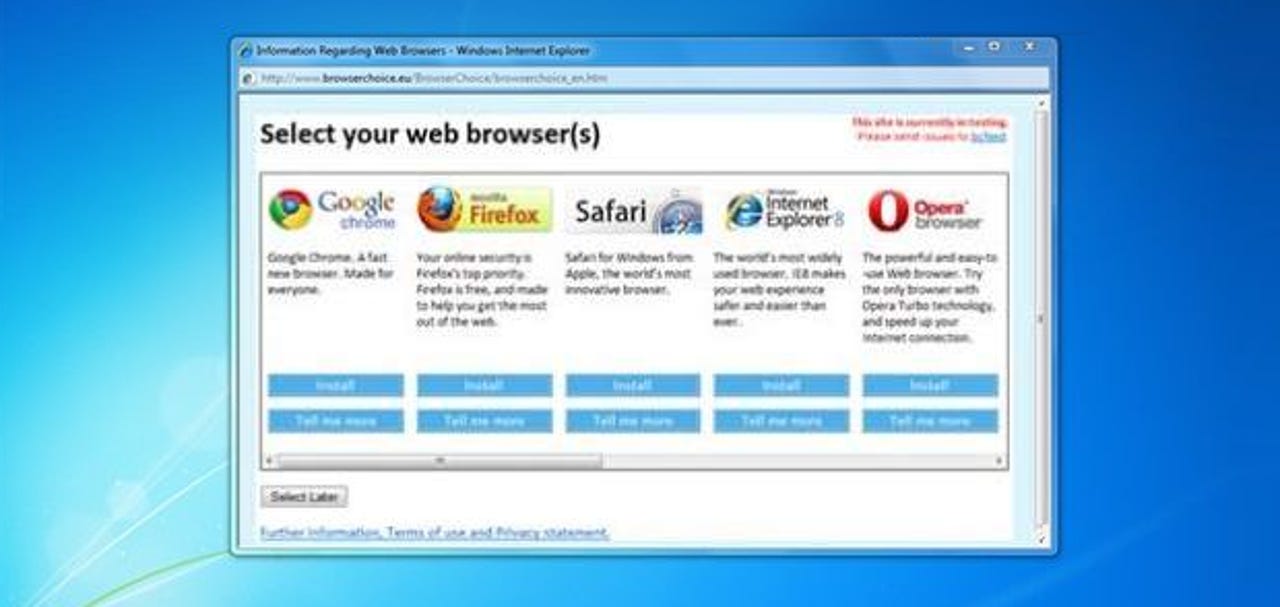Windows RT may breach Microsoft-EU 'browser ballot' deal

Microsoft's plan to restrict desktop-running third-party browsers, such as Mozilla's Firefox and Google's Chrome, on its forthcoming operating system may fall foul of a settlement reached between the software giant and the European regulators.
The European Commission said it will remain "vigilant" to Microsoft's competition commitments in the browser space, but admitted it wasn't sure whether the tablet edition of Windows 8 fell actually fell within the scope of the agreement, according to IDG.
Europe is scratching its head: the agreement applies only to "client PCs," but is nobody is quite sure whether it applies to tablets or not.

Mozilla blew the whistle on the browser ballot case in a May 9 company blog post. Mozilla general counsel Harvey Anderson said:
"If Windows on ARM is simply another version of Windows on new hardware, it also runs afoul of the EC browser choice commitments and seems to represent the very behavior the DOJ-Microsoft settlement sought to prohibit."
Windows has always shipped with a version of Internet Explorer. But it was forced to open its doors to competing browsers after it fell foul of European antitrust laws.
In 2010, Microsoft issued an update to European users of Windows that presented a 'browser ballot' screen, after the company was found to have abused its dominant market position by bundling Internet Explorer in with the operating system.
The ballot screen allows users to pick a browser away from the default-set Internet Explorer. The top ten browsers in market share, including Internet Explorer itself, are on the list though randomised to prevent favouring one over the other.
Microsoft settled in the antitrust investigation and avoided facing fines of up to 10 percent of its global annual turnover. The deal, which used non-specific "Windows" and "Internet Explorer" terms to account for future versions, is set to expire in 2014, giving adequate time for rival browsers to gain traction and compete fairly on the browser market.
Microsoft's decision to restrict Internet Explorer 10 to Windows RT sparked the furore.
A Senate committee has already raised its eyebrows at the move, which would see all browsers bar Internet Explorer 10 running in Metro mode rather than on the behind-the-scenes desktop mode.
Windows RT, also known as 'Windows 8 on ARM', will only allow Chrome, Firefox, and others to run in Metro, which offers a vastly slimmed-down experience. Only certain hand-picked applications will be able to run in Windows RT's desktop mode, such as the next version of Office.
Sources told sister site CNETthat only a "handful of Windows RT devices" will appear at first, as Microsoft tests the water with its new tablet venture. Microsoft may have centered Windows 7 on touch devices, but this is the first time it has dedicated a whole Windows edition to tablets.
But an antitrust suit does not have to stem from a monopoly in a market. A case can still be brought even if a minority player stifled competition in some way. A case could be made that Microsoft is using its monopoly on Windows to keep Internet Explorer in the top-spot in browser market share rankings as it faces stiff competition from both Firefox and Chrome.
If European authorities find Windows RT is in effect "another version of Windows", Microsoft could face a heavy rebuke and see a massive fine land in its lap. On the other hand, Microsoft may not be out of the crosshairs yet as it could face a separate inquiry altogether.
Related:
- Senate panel eyes Windows RT browser restrictions
- CNET: Windows RT devices will see limited release initially
- CNET: Microsoft bans Firefox on ARM-based Windows, Mozilla says
- Google agrees with Mozilla’s Windows RT browser concerns
- ZDNet: Microsoft set to begin browser-ballot rollout in Europe
- Gallery: How Microsoft's browser ballot works
- ZDNet: Mozilla and Google accuse Microsoft of unfair browser competition
- Google paying Mozilla $300 million per year for search deal
- Mozilla begins development of Firefox for Metro
- Google joins Windows 8 browser war with plans for Metro Chrome